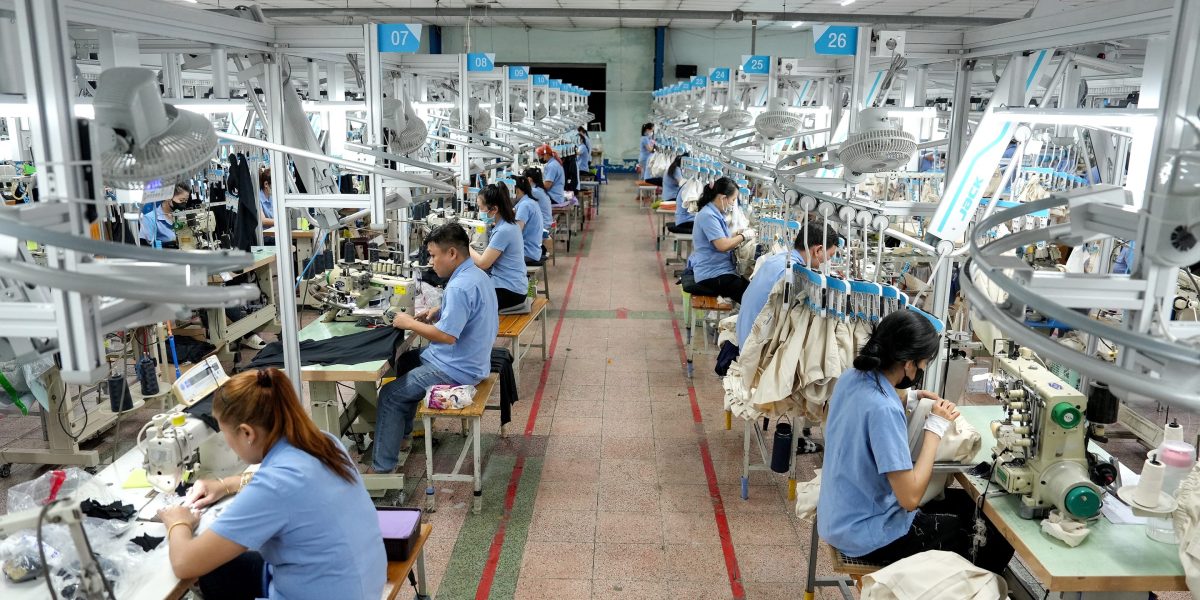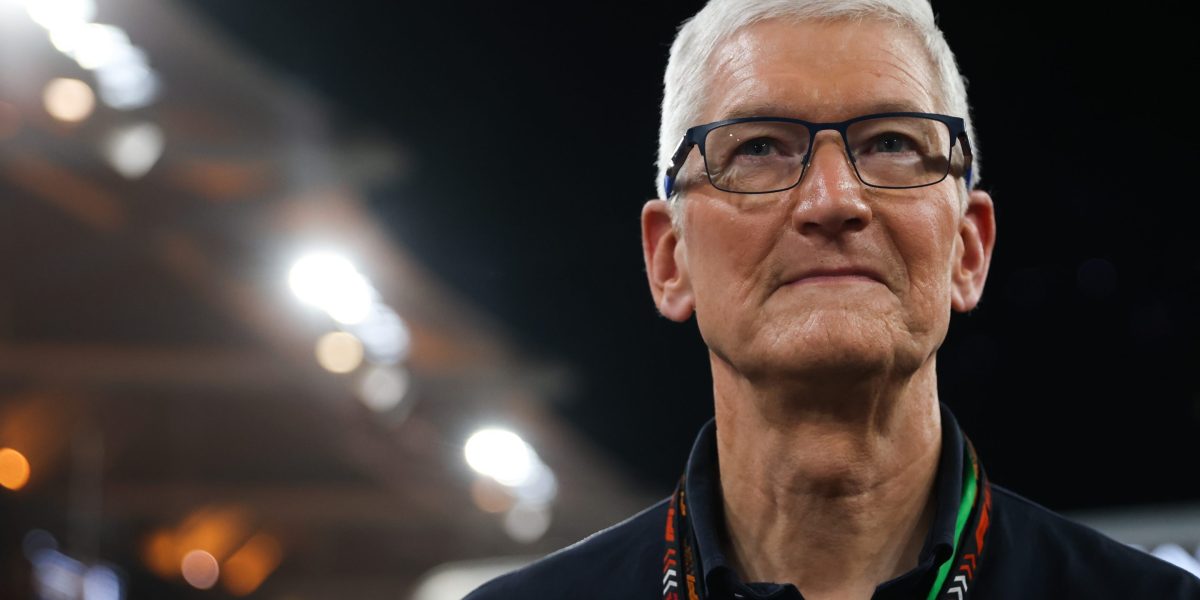- Apple and Meta have been pouring significant capital into augmented-reality “smart glasses.” One source told Bloomberg that Tim Cook reportedly “cares about nothing else” from a product development standpoint. If he can beat Mark Zuckerberg to a pair of stylish smart glasses that make an impact in the market, he might just beat the accusations he doesn’t have the same panache for groundbreaking products as his predecessor, Apple cofounder Steve Jobs.
While the iPhone accounts for roughly 56% of Apple’s revenue, according to its quarterly earnings report released in January, the company’s CEO Tim Cook is hot for augmented reality, the technology that underpins the not-nearly-as-popular $3,500 Vision Pro headset. (Production on the Vision Pro reportedly halted in January amid slow demand.)
In fact, according to Bloomberg’s Mark Gurman, a longtime Apple reporter with deep connections inside the company, Cook is “hell-bent” on creating a pair of truly smart glasses before Mark Zuckerberg can at Meta. A source with knowledge of the matter told Gurman “Tim cares about nothing else.”
“It’s the only thing he’s really spending his time on from a product development standpoint,” the person said.
After years of teasing, Apple finally released the Vision Pro in February 2024. The headset offers both virtual and augmented reality experiences: Thanks to an array of cameras on the device that point outward, as well as cameras that track your eye movements inside the goggles, it can appear as if virtual and digital elements exist in your real environment that you can interact with (that’s augmented reality), but you can also enjoy complete immersion in realistic virtual environments (virtual reality). While great for watching movies in virtual environments (like the surface of the moon), it’s also a capable work device, since it can mirror what you’re doing on your Mac computer(s).
Meta, meanwhile, has been working on VR and AR technologies for quite a long time. Facebook acquired Palmer Luckey’s Oculus VR for $2 billion in 2014, and released its first consumer VR headset, the Oculus Rift, two years later in 2016. Meta began laying the groundwork for AR experiences as early as 2017, but its hardware plans really took shape when in 2021 it released Ray-Ban Stories, a pair of smart glasses with cameras and audio built-in. Last year, it unveiled a pair of augmented-reality smart glasses called “Orion” that blew several journalists away, but those are still in development.
Zuckerberg previously said Apple and Meta have a “very deep, philosophical competition” in AR and VR, since Apple’s approach involves a tight integration of hardware and software (as it does with all its devices), whereas Meta’s vision revolves around a device-agnostic experience so its software can live on different types of VR and AR devices, including those not made by Meta. The Meta CEO believes the “metaverse” will be the successor to the mobile internet, where your virtual avatars can move between platforms for work, play, and of course, socializing. (Investors, meanwhile, haven’t been as thrilled with how much money Meta has been pouring into the metaverse.)
Zuckerberg, however, is a major proponent of the technologies. He notably shared a three-minute review of Apple’s Vision Pro on Instagram shortly after its debut, but, as you might expect, he mostly criticized the device and used it as an opportunity to advertise Meta’s Quest 3 headset, saying his company’s device is lighter and cheaper. But the video highlighted the competitive nature between the two companies on this emerging technology. Basically, both Apple and Meta are racing to make their devices’ form factors smaller and more powerful until they finally achieve a hardware product that looks like a normal pair of glasses, albeit much more high-tech.
Cook has been hot on the potential of augmented reality for most of his tenure at Apple—and has been a vocal advocate for the technology, on the record, for roughly a decade. In a quarterly earnings call in July 2016, Cook said “we are high on AR for the long run,” while mentioning the success of Pokémon Go, the hottest mobile game at that time that relied heavily on augmented-reality tech.
Later that year while appearing at Utah Tech Tour, Cook said he predicted “a significant portion of the population on of developed countries” to have AR experiences “every day, almost like eating three meals a day, it will become that much a part of you.
“Few people in here think it’s acceptable to be tethered to a computer,” he said. “We’re all social people at heart. Even introverts are social people,” adding “AR will become really big.”
Over the years, Cook mentioned how he was “incredibly excited by AR” because he could “see uses for it everywhere.”
“I can see uses for it in education, in consumers, in entertainment, in sports. I can see it in every business that I know anything about,” he said at a 2017 event hosted by the University of Oxford.
While Cook has made Apple more successful than the company has ever been from a financial standpoint, the Vision Pro is one of the few original hardware products launched during his tenure as CEO, so it makes sense that it’s one of his sole focuses “from a product development standpoint,” as Bloomberg‘s source told Gurman. Steve Jobs, Cook’s predecessor and Apple’s cofounder, was considered a “visionary,” however, having a major hand in designing and launching Apple’s most iconic products including the iPod, iPhone, iPad, Mac (desktop and laptop configurations, including the wildly popular MacBook Air) and getting the deals done to make the iTunes Store possible. (Music streaming as an industry may not have come to pass without it.)
Cook was Apple’s COO under Jobs: He was considered an operations expert and a key to making Apple’s supply chain in Asia a profitable enterprise. But when Jobs died in 2011, many questioned Cook’s ability to shape landmark products in the same way Jobs could. The Apple Watch and AirPods have been major successes under Cook, but other products like the HomePod or AirTags haven’t created as much hype. On the contrary, those products may have generated undesirable publicity. And with Apple reportedly canceling its plans for a car, Cook is likely feeling more pressure for such a costly investment as the Vision Pro to succeed.
Both Apple and Meta are spending a significant chunk of change on research and development, which is key to getting these AR-powered goggles small enough to look like a stylish pair of high-tech glasses. Apple allocated $31.4 billion to R&D in 2024, a near-5% increase from the year before, while Meta earmarked a whopping $43.9 billion to R&D last year, a 14% jump from the year prior.
This story was originally featured on Fortune.com
Source link


 Entertainment8 years ago
Entertainment8 years ago
 Politics8 years ago
Politics8 years ago
 Entertainment8 years ago
Entertainment8 years ago
 Entertainment8 years ago
Entertainment8 years ago
 Tech8 years ago
Tech8 years ago
 Tech8 years ago
Tech8 years ago
 Tech8 years ago
Tech8 years ago
 Politics8 years ago
Politics8 years ago






